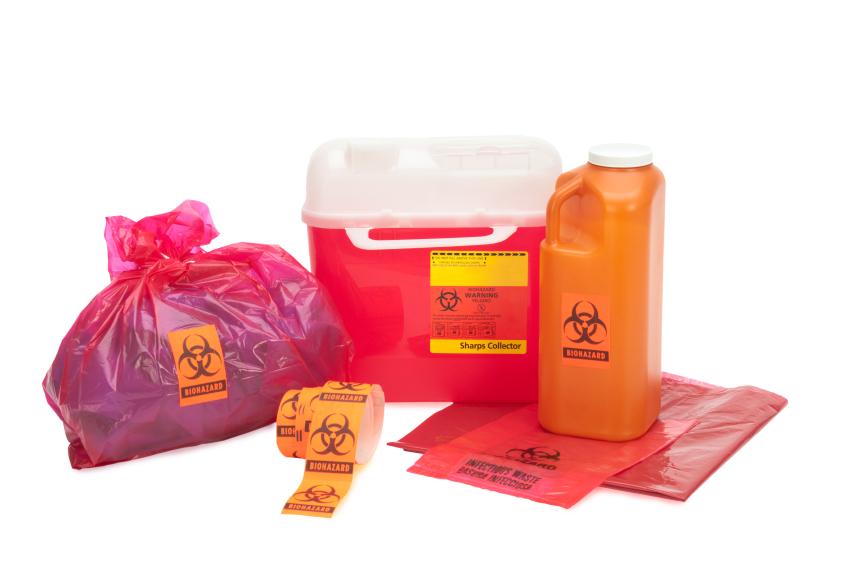Navigating Safety: The Essential Overview to Medical Waste Disposal Finest Practices
Wiki Article
Discovering Various Garbage Disposal Options for a Cleanser Environment
In the search of a cleaner setting, the monitoring of waste disposal has actually emerged as an essential focal point for lasting growth. With a wide variety of waste disposal choices readily available, ranging from standard land fill approaches to cutting-edge waste-to-energy modern technologies, the choice of how we handle our waste has significant implications for our world's wellness.Recycling Techniques
Carrying out reliable recycling approaches is vital in reducing waste and promoting sustainability in our atmosphere. Reusing involves the process of transforming waste materials right into recyclable things to stop unnecessary disposal. Among one of the most common recycling approaches is worldly recovery, where materials like paper, glass, plastic, and steel are collected, arranged, and processed to develop new items. This procedure not only conserves natural sources yet additionally reduces energy usage and greenhouse gas emissions connected with creating new products from the ground up.An additional important recycling method is composting, which entails breaking down natural waste like food scraps and yard trimmings right into nutrient-rich soil. This process not only draws away organic waste from garbage dumps yet likewise produces a beneficial resource for gardening and agriculture. Furthermore, upcycling is an imaginative recycling approach that includes changing old or discarded materials into items of better or value. By integrating these numerous recycling techniques right into our waste administration methods, we can significantly reduce our environmental impact and move in the direction of a more sustainable future.

Composting Strategies
Effective waste administration methods, such as reusing methods, pave the way for a cleaner environment, and now, moving the focus to 'Composting Techniques', we check out sustainable ways to decay natural waste for ecological benefit. medical waste removal near me.Composting is a natural process that transforms organic waste, like food scraps and yard trimmings, into a nutrient-rich dirt change. The secret to effective composting depends on developing the ideal balance of green products, such as vegetables and fruit scraps, and brownish materials, like dried fallen leaves and branches. These materials decay with the assistance of bacteria, damaging down the waste right into useful garden compost.
There are numerous composting methods available to suit different needs. Typical yard composting entails layering organic materials in a container or stack and regularly turning the mixture to aerate it. Vermicomposting, on the other hand, uses worms to break down raw material into garden compost (click here). For those with limited area, indoor composting systems give a practical solution. By making use of composting strategies, we can lower the quantity of waste sent out to landfills while developing an advantageous product for enhancing soil and supporting plant growth.
Incineration Pros and Disadvantages
Incineration, as a waste disposal method, presents both benefits and negative aspects that merit mindful consideration in the world of sustainable waste monitoring methods. On the silver lining, incineration can substantially lower the volume of waste, lessening the need for landfill area and potentially decreasing greenhouse gas emissions. Incineration additionally enables the healing of power with the generation of electricity or heat, adding to source healing. In addition, the procedure can be used to damage harmful materials, using a secure method for handling particular kinds of waste that may position threats to public health and wellness and the atmosphere if left neglected.Additionally, the high first financial investment and functional costs of incineration centers position financial challenges, making it a less affordable choice compared to other waste monitoring strategies. Cautious monitoring and law are necessary to mitigate these adverse impacts and make the most of the advantages of incineration as component of a comprehensive waste management technique.
Landfill Management Approaches
Garbage dumps play a vital duty in waste management and ecological preservation by offering a control system for the disposal of strong waste materials. By condensing the waste, the quantity is lowered, enabling for more waste to be accommodated over time.Moreover, the application of daily cover methods is vital in minimizing smells, stopping clutter, and lowering the attraction of insects. Treatment the disposed waste at the end of daily helps to consist of odors and stop prospective ecological contamination. In addition, the monitoring of garbage dump gas exhausts and leachate degrees is crucial in making certain that ecological standards are fulfilled which any kind of potential dangers to bordering ecological communities are minimized.

Waste-to-Energy Technologies
One of the ingenious techniques to squander management entails taking advantage of Waste-to-Energy innovations to convert strong waste right into useful power resources. Waste-to-Energy (WtE) technologies include a variety of procedures that aim to draw out power from waste materials their explanation with thermal, chemical, or organic means. This conversion procedure not only reduces the volume of waste that winds up in land fills yet likewise generates useful energy sources such as electrical power, warmth, or biofuels.There are a number of methods of Waste-to-Energy conversion, including gasification, pyrolysis, and incineration. Incineration involves burning waste at heats to create heat and electrical power. Gasification transforms waste into a syngas, which can be utilized for power generation or chemical manufacturing. Pyrolysis breaks down natural materials using high temperature levels in the lack of oxygen, creating char, bio-oil, and gas.
Applying Waste-to-Energy technologies can aid mitigate ecological problems related to conventional garbage disposal methods while concurrently giving a renewable energy source. Nonetheless, cautious consideration should be provided to emissions control and making certain the sustainability of feedstock materials for these modern technologies to be really beneficial for a cleaner environment.
.jpg)
Verdict
Finally, checking out different garbage disposal options such as recycling, composting, incineration, garbage dump monitoring, and waste-to-energy modern technologies is essential for advertising a cleaner setting - click here. Each method has its very own advantages and challenges, but by utilizing a mix of these techniques, we can function towards reducing the quantity of waste that winds up in landfills and eventually add to a much more sustainable future for generations to comeWith a plethora of waste disposal alternatives available, ranging from conventional garbage dump methods to ingenious waste-to-energy innovations, the option of how we manage our waste has far-ranging implications for our earth's wellness. medical waste removal service.Incineration, as a waste disposal method, presents both benefits and disadvantages that warrant mindful consideration in the realm of lasting waste administration methods.Garbage dumps play a crucial duty in waste administration and environmental conservation by offering a containment system for the disposal of solid waste products. By compacting the waste, the quantity is minimized, allowing for even more waste to be accommodated over time
One of the cutting-edge techniques to waste management involves harnessing Waste-to-Energy technologies to convert strong waste into useful power sources.
Report this wiki page